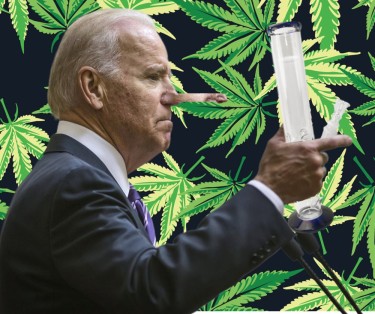
Vice President Kamala Harris emphasized on Friday that no one should be imprisoned for using cannabis and encouraged the federal government to move quickly to reschedule the drug.
“Prompt action must be taken,” said Harris. “We need to make a decision based on careful investigation and evaluation. It’s ridiculous that marijuana is considered to be as harmful as heroin, let alone more dangerous than fentanyl, demonstrating how seriously flawed the present categorization of the drug is. This defies logic and is unfair.”
The Drug Enforcement Administration now lists marijuana in the same Schedule as substances like heroin, ecstasy, and LSD. This grade suggests no established medicinal benefits and significant risk. Marijuana reformers have long called for the federal government to either reclassify marijuana or remove it entirely from the list of prohibited narcotics.
People with offenses linked to marijuana were pardoned by President Joe Biden, and Vice President Harris visited with these individuals in the White House. Among the distinguished attendees were rapper Fat Joe, whose actual name is Joseph Cartagena, and Kentucky Governor Andy Beshear (D).
President Biden pardoned hundreds of people who had been found guilty of marijuana-related offenses between October 2022 and December 2023. The president also directed Secretary of Health and Human Services Xavier Becerra to start the process of reevaluating marijuana’s categorization in addition to these pardons.
After a thorough analysis of the health concerns associated with marijuana, Becerra’s office suggested that the DEA reschedule marijuana as a Schedule 3 drug. This action would lessen the priority of marijuana enforcement, lessen some criminal penalties, and provide marijuana firms with access to certain tax deductions—all without legalizing marijuana or easing regulatory constraints on the sector.
Harris’ comments are in line with previous initiatives by Biden’s reelection campaign and administration to highlight laws intended to increase access to marijuana.
“In his State of the Union address, President Biden emphasized that no one should be imprisoned for using or possessing marijuana.”
Vice President Harris expressed this opinion once more on Friday, saying, “No one should be incarcerated for simply smoking weed.”
For two people who were previously recognized for taking strong positions against drugs, Biden and Harris’ comments represent dramatic changes similar to the “Nixon goes to China” situation. In his capacity as a senator during the height of the War on Drugs in the 1980s and 1990s, Biden helped pass strict drug restrictions. Analogously, Harris enforced marijuana restrictions when serving as a district attorney and then as the attorney general of California. She also famously opposed a 2010 ballot initiative that would have legalized marijuana.
However, in the present day, marijuana legalization enjoys widespread support, with over 70% of the U.S. population favoring it, according to a 2023 Pew poll.
Biden’s Efforts to Address Past Injustices
A major shift from earlier drug policy measures may be seen in President Joe Biden’s decision to pardon hundreds of people found guilty of marijuana-related charges between October 2022 and December 2023. In addition to providing comfort to people who were wrongfully punished by antiquated laws, these pardons also demonstrate a larger commitment to redressing historical wrongs. Biden’s efforts highlight a trend toward a more egalitarian and humane approach to criminal justice reform by addressing the disproportionate impact that punitive drug policies have on underprivileged populations.
Furthermore, the granting of these pardons is a symbolic acknowledgement of the need to rectify systematic imbalances in the criminal justice system. Individuals, particularly those from ethnic and economically underprivileged backgrounds, have long been subjected to severe drug sentencing policies, resulting in cycles of incarceration and disenfranchisement. Biden’s willingness to tackle this reality through presidential clemency reflects a readiness to acknowledge previous policy failings and shift toward a more restorative form of justice.
Apart from the pardons, the Biden administration has been aggressively pushing for a reassessment of the categorization of marijuana, seeing the need to match federal drug policy to changing public perceptions and scientific data. The government has demonstrated its commitment to evidence-based decision-making and public health issues by ordering Health and Human Services Secretary Xavier Becerra to begin a review of marijuana’s scheduling. In addition to creating the possibility of rescheduling marijuana, this proactive strategy opens the door to more extensive conversations on harm reduction tactics and drug policy change.
A Step Towards Fairness and Reform
The proposal to reassess marijuana’s categorization marks a turning point in the current discussion over changing drug laws. The administration of President Biden has demonstrated initiative in reevaluating marijuana’s scheduling, indicating an awareness of the necessity to modify federal drug laws to match the views of modern society and scientific knowledge. The administration has shown that it is committed to using science to inform decisions and taking public health concerns into account by giving Health and Human Services Secretary Xavier Becerra instructions to start a review of marijuana scheduling.
Marijuana is now classified as a Schedule I substance, which is largely considered to be out of date and disproportionate, alongside substances like heroin, ecstasy, and LSD. It has long been maintained by proponents of drug policy reform that this classification is inadequate in light of marijuana’s possible medical benefits and relatively low-risk profile. Marijuana rescheduling, as suggested by Becerra’s office, would both acknowledge these limitations and mark a move toward a more realistic and nuanced approach to drug policy.
Additionally, rescheduling marijuana might lessen some of the negative effects of harsh drug laws, especially for underprivileged groups who are disproportionately impacted by drug enforcement. Rescheduling might lessen the burden of jail and social stigma encountered by those convicted of nonviolent marijuana offenses by increasing the focus on marijuana enforcement and decreasing some criminal penalties. Furthermore, granting marijuana companies access to certain tax deductions may promote a more just and long-lasting cannabis market.
The movement to reschedule marijuana is a vital step toward drug policy reform and equity. The existing categorization system contains inequities and inconsistencies that the Biden administration may address to improve social justice and public health in addition to modernizing federal drug policy.
Bottom Line
Vice President Kamala Harris’s advocacy for the rescheduling of cannabis, coupled with President Joe Biden’s pardons for individuals with marijuana-related offenses, marks a significant departure from past drug policies. This shift reflects a recognition of the need for criminal justice reform, a commitment to addressing historical injustices, and an acknowledgment of evolving public attitudes towards marijuana. By prioritizing evidence-based policymaking and public health considerations, the administration’s efforts signal a step towards a more equitable and humane approach to drug policy. Rescheduling marijuana holds the potential to mitigate the disproportionate impact of harsh drug laws and foster a fairer cannabis market, ultimately promoting social justice and public health outcomes.
BIDEN HARRIS ON WEED AROUND ELECTION TIME, READ ON..
JOE BIDEN STARTS UP HIS BLAH, BLAH, BLAH CANNABIS REFORM RHETORIC!
- SEO Powered Content & PR Distribution. Get Amplified Today.
- PlatoData.Network Vertical Generative Ai. Empower Yourself. Access Here.
- PlatoAiStream. Web3 Intelligence. Knowledge Amplified. Access Here.
- PlatoESG. Carbon, CleanTech, Energy, Environment, Solar, Waste Management. Access Here.
- PlatoHealth. Biotech and Clinical Trials Intelligence. Access Here.
- Source: http://cannabis.net/blog/news/vp-kamala-harris-silent-on-cannabis-reform-for-almost-4-years-now-says-she-is-all-in-on-resched




